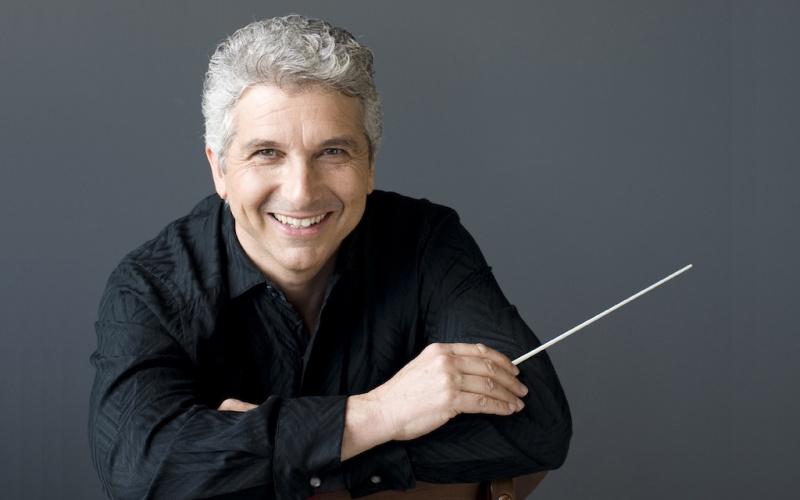Wang, RSNO, Oundjian, Usher Hall, Edinburgh review - percussion sets Shostakovich's 'Leningrad' ablaze | reviews, news & interviews
Wang, RSNO, Oundjian, Usher Hall, Edinburgh review - percussion sets Shostakovich's 'Leningrad' ablaze
Wang, RSNO, Oundjian, Usher Hall, Edinburgh review - percussion sets Shostakovich's 'Leningrad' ablaze
Music Director pairs two very different Russian works in his final season

Featuring two Russian composers, the two halves of the Royal Scottish National Orchestra’s programme could hardly have been more different. In the first, pianist Xiayin Wang (pictured below) joined the RSNO for Scriabin’s florid, rarely-heard Piano Concerto.
While this made for a captivating orchestral presence, Wang’s solo playing was for most of the first movement either overshadowed or downright drowned out. Which was a shame, since when audible, it was rather lovely. She gave an illustrated level of detail to the score showing a mastery of the technicalities of the piece. During the unaccompanied passages of the second movement, she exuded a dream-like quality from the piano’s upper registers that gave gentle, celestial qualities to the music, but still had a sharp, zesty piquancy.
Wang’s playing in the third and final movement was, at long last, rousing and strong, but she still struggled to hold her own over the orchestra’s vast forces. While she rose to the fore for much of it, at times in the final sections the piano was yet again lost to an overly bulky blanket of strings. There’s no doubt that Wang is an exceptionally talented musician with an intensive mastery of her instrument, and her playing on Friday was detailed, animated and intelligent. It was sadly just a little too polite to fully carry the depth of Scriabin’s score, especially against such a large orchestra.  Oundjian once again took to the podium for a far more lengthy second half. Shostakovich’s meaty Seventh Symphony, the "Leningrad", was given a thorough and visceral exposition. This is where such a huge string section makes sense. The uniformity of such a vast number of musicians boldly marked the angular lines of the symphony’s opening bars, and the orchestra was sensitive to the solo playing of those from among their own ranks – perhaps more so than to the first half’s soloist. A soft, single snare drum was beautifully complemented by steady pizzicatos, and as the tune was passed around the woodwind, the instrumental balance was always spot on, with a precise dynamic variance unfortunately missing in the concert’s first half. Even when the music turned to its most tumultuous and cacophonous, Oundjian seamlessly maintained the music’s stability.
Oundjian once again took to the podium for a far more lengthy second half. Shostakovich’s meaty Seventh Symphony, the "Leningrad", was given a thorough and visceral exposition. This is where such a huge string section makes sense. The uniformity of such a vast number of musicians boldly marked the angular lines of the symphony’s opening bars, and the orchestra was sensitive to the solo playing of those from among their own ranks – perhaps more so than to the first half’s soloist. A soft, single snare drum was beautifully complemented by steady pizzicatos, and as the tune was passed around the woodwind, the instrumental balance was always spot on, with a precise dynamic variance unfortunately missing in the concert’s first half. Even when the music turned to its most tumultuous and cacophonous, Oundjian seamlessly maintained the music’s stability.
Shifting to the dignified second movement, principal oboist Adrian Wilson’s solo was gorgeously light and lyrical. There are dark undertones to this movement, but these were understated, and even the piercing E flat clarinet solo had an elegance to match its edge
Oundjian steered the orchestra powerfully through the stark differences in musical mindsets, from the serene to spiky rhythms of the third movement to the myriad moods of the tempestuous finale. By its second part, the music’s hard edge had softened a little bit, but there was still a steeliness to it: a resolve, a determination, a primary-coloured vibrancy. This is a symphony jam packed with ideas, and the RSNO on Friday night gave voice to each and every one with strings both silky yet strong, clear and precise woodwind and rich brass. It was the percussion’s night, though; the bite of the snare drum and build of the timpani exuded a gripping potential energy that seeped into the pores of the piece, further igniting Shostakovich's triumphant score.
rating
Explore topics
Share this article
The future of Arts Journalism
You can stop theartsdesk.com closing!
We urgently need financing to survive. Our fundraising drive has thus far raised £49,000 but we need to reach £100,000 or we will be forced to close. Please contribute here: https://gofund.me/c3f6033d
And if you can forward this information to anyone who might assist, we’d be grateful.

Subscribe to theartsdesk.com
Thank you for continuing to read our work on theartsdesk.com. For unlimited access to every article in its entirety, including our archive of more than 15,000 pieces, we're asking for £5 per month or £40 per year. We feel it's a very good deal, and hope you do too.
To take a subscription now simply click here.
And if you're looking for that extra gift for a friend or family member, why not treat them to a theartsdesk.com gift subscription?
more Classical music
 Hallé John Adams festival, Bridgewater Hall / RNCM, Manchester review - standing ovations for today's music
From 1980 to 2025 with the West Coast’s pied piper and his eager following
Hallé John Adams festival, Bridgewater Hall / RNCM, Manchester review - standing ovations for today's music
From 1980 to 2025 with the West Coast’s pied piper and his eager following
 Kaploukhii, Greenwich Chamber Orchestra, Cutts, St James's Piccadilly review - promising young pianist
A robust and assertive Beethoven concerto suggests a player to follow
Kaploukhii, Greenwich Chamber Orchestra, Cutts, St James's Piccadilly review - promising young pianist
A robust and assertive Beethoven concerto suggests a player to follow
 Robin Holloway: Music's Odyssey review - lessons in composition
Broad and idiosyncratic survey of classical music is insightful but slightly indigestible
Robin Holloway: Music's Odyssey review - lessons in composition
Broad and idiosyncratic survey of classical music is insightful but slightly indigestible
 Classical CDs: Wolf-pelts, clowns and social realism
British ballet scores, 19th century cello works and contemporary piano etudes
Classical CDs: Wolf-pelts, clowns and social realism
British ballet scores, 19th century cello works and contemporary piano etudes
 Bizet in 150th anniversary year: rich and rare French offerings from Palazzetto Bru Zane
Specialists in French romantic music unveil a treasure trove both live and on disc
Bizet in 150th anniversary year: rich and rare French offerings from Palazzetto Bru Zane
Specialists in French romantic music unveil a treasure trove both live and on disc
 Scottish Chamber Orchestra, Ibragimova, Queen’s Hall, Edinburgh review - rarities, novelties and drumrolls
A pity the SCO didn't pick a better showcase for a shining guest artist
Scottish Chamber Orchestra, Ibragimova, Queen’s Hall, Edinburgh review - rarities, novelties and drumrolls
A pity the SCO didn't pick a better showcase for a shining guest artist
 Kilsby, Parkes, Sinfonia of London, Wilson, Barbican review - string things zing and sing in expert hands
British masterpieces for strings plus other-worldly tenor and horn - and a muscular rarity
Kilsby, Parkes, Sinfonia of London, Wilson, Barbican review - string things zing and sing in expert hands
British masterpieces for strings plus other-worldly tenor and horn - and a muscular rarity
 From Historical to Hip-Hop, Classically Black Music Festival, Kings Place review - a cluster of impressive stars for the future
From quasi-Mozartian elegance to the gritty humour of a kitchen inspection
From Historical to Hip-Hop, Classically Black Music Festival, Kings Place review - a cluster of impressive stars for the future
From quasi-Mozartian elegance to the gritty humour of a kitchen inspection
 Shibe, LSO, Adès, Barbican review - gaudy and glorious new music alongside serene Sibelius
Adès’s passion makes persuasive case for the music he loves, both new and old
Shibe, LSO, Adès, Barbican review - gaudy and glorious new music alongside serene Sibelius
Adès’s passion makes persuasive case for the music he loves, both new and old
 Anja Mittermüller, Richard Fu, Wigmore Hall review - a glorious hall debut
The Austrian mezzo shines - at the age of 22
Anja Mittermüller, Richard Fu, Wigmore Hall review - a glorious hall debut
The Austrian mezzo shines - at the age of 22
 First Person: clarinettist Oliver Pashley on the new horizons of The Hermes Experiment's latest album
Compositions by members of this unusual quartet feature for the first time
First Person: clarinettist Oliver Pashley on the new horizons of The Hermes Experiment's latest album
Compositions by members of this unusual quartet feature for the first time

Add comment